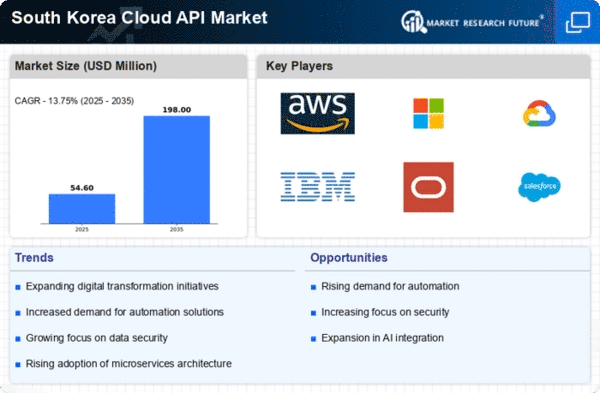Increased Focus on Data Analytics
The cloud api market in South Korea is significantly influenced by the growing emphasis on data analytics among businesses. As organizations generate vast amounts of data, the need for effective data management and analysis becomes critical. Cloud APIs facilitate the integration of advanced analytics tools, enabling companies to derive actionable insights from their data. Recent statistics indicate that over 60% of South Korean firms are investing in data analytics capabilities, which often rely on cloud-based solutions. This trend not only enhances decision-making processes but also drives innovation, positioning the cloud api market as a vital component in the broader data ecosystem.
Government Initiatives and Support
The South Korean government plays a pivotal role in fostering the growth of the cloud api market through various initiatives and support programs. With a focus on enhancing the country's technological infrastructure, the government has allocated substantial funding to promote cloud adoption among businesses. For instance, the Ministry of Science and ICT has launched initiatives aimed at encouraging small and medium-sized enterprises (SMEs) to transition to cloud services. This support is expected to drive the cloud api market, as SMEs represent a significant portion of the economy. Furthermore, government policies that prioritize cybersecurity and data protection are likely to enhance trust in cloud solutions, further propelling market growth.
Emergence of Industry-Specific Solutions
The cloud api market is witnessing a trend towards the development of industry-specific solutions tailored to meet the unique needs of various sectors in South Korea. As businesses seek to optimize their operations, cloud APIs are being customized to address specific challenges faced by industries such as retail, manufacturing, and logistics. This specialization is likely to enhance the appeal of cloud APIs, as organizations recognize the value of solutions designed to integrate seamlessly with their existing systems. The emergence of these tailored solutions may contribute to a more robust cloud api market, as companies increasingly prioritize functionality and compatibility in their technology investments.
Rising Demand for Digital Transformation
The Cloud API Market in South Korea experiences a notable surge in demand driven by the ongoing digital transformation across various sectors. Organizations are increasingly adopting cloud-based solutions to enhance operational efficiency and agility. According to recent data, approximately 70% of enterprises in South Korea have initiated digital transformation projects, which often necessitate the integration of cloud APIs. This trend is particularly evident in industries such as finance and healthcare, where the need for real-time data access and seamless interoperability is paramount. As businesses strive to remain competitive, the cloud api market is likely to benefit from this shift, as companies seek to leverage cloud technologies to streamline processes and improve customer experiences.
Growing Importance of Collaboration Tools
The rise of remote work and collaboration has significantly impacted the cloud api market in South Korea. As organizations adapt to new work environments, the demand for collaboration tools that leverage cloud APIs has surged. These tools facilitate communication and project management, enabling teams to work effectively regardless of their physical location. Recent surveys indicate that approximately 75% of South Korean companies are investing in cloud-based collaboration solutions, which often rely on APIs for integration with other software. This growing importance of collaboration tools is likely to drive the cloud api market, as businesses seek to enhance productivity and maintain connectivity in an increasingly digital landscape.
















